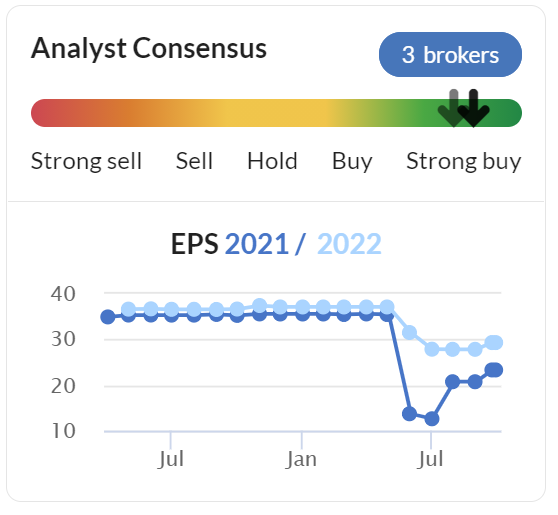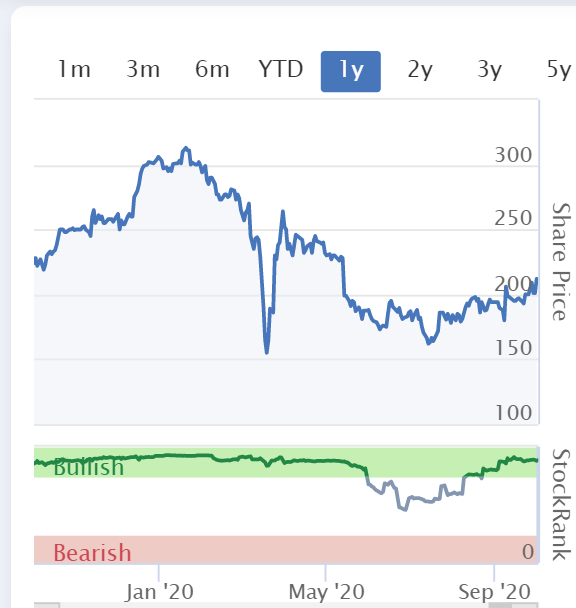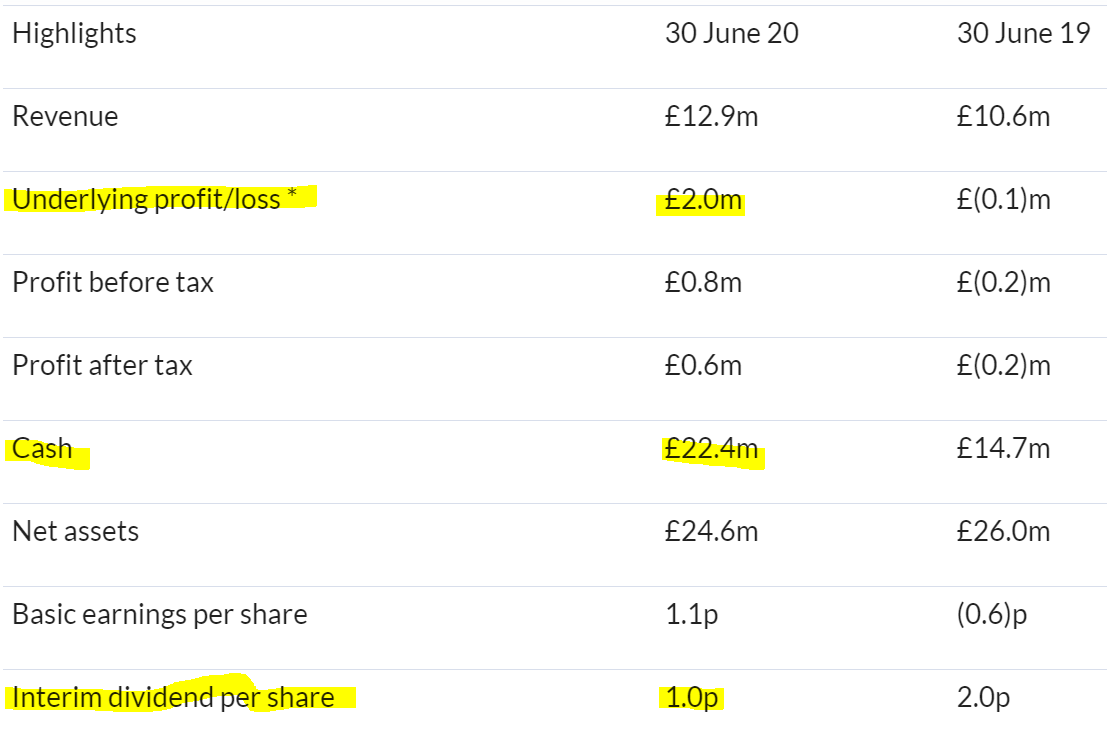Good morning, it's Paul here with Friday's SCVR.
Portmeirion interview - here is the link to my audio interview today with Mike Raybould, CEO of Portmeirion (LON:PMP) (I hold), which I hope you find interesting.
Timings - should be mostly done by 1pm.
Agenda - as usual, Friday is quiet for announcements. These are the companies (below) that I'm going to be writing about today. If a company doesn't interest you, then please skip to the next section. I cover about 500 companies in total, which should provide enough variety for everyone. Comments on which companies I cover are distinctly unwelcome (because they just cause negativity), and I don't take any notice of them anyway! If you don't find my reports interesting, then maybe don't read/comment on them?
Saga (LON:SAGA) - results of open offer (refinancing)
Cenkos Securities (LON:CNKS) - Interim results
Wincanton (LON:WIN) - trading update
.
US President - covid
I've just heard the news that President Trump, and the First Lady, have tested positive for covid. That's knocked the futures overnight, as it throws a spanner of uncertainty into the US election. The comment that he will be continuing with his duties as normal, is pie in the sky. As a 74 year old, overweight man, he's at high risk. This virus can knock the stuffing out of you, for quite some time, as I experienced in March/April. It will be interesting to see how things pan out - will someone deputise for him? Whatever people think of his politics (no comments on that either please!), basic humanity means I wish him & his wife a full recovery.
.
Wincanton (LON:WIN)
220p (up 5%) - mkt cap £277m
· Trading remains resilient underpinned by strong eFulfilment performance
· Agreement reached on 2020 triennial valuation of pension scheme
For background, it's worth recapping on my notes on the trading update here from 20 July.
Wincanton plc, the largest British third-party logistics company, today issues the following trading update ahead of its half year results for the six months ended 30 September 2020.
- H1 was "resilient"
- eCommerce is growth area
- "Encouraging" new business wins (examples given, of big name client wins/renewals)
- Guidance unchanged from 9 Sept update (materially ahead of [greatly reduced] forecasts)
- Results for H1 will be issued on 5 Nov
- Very surprising to see a net cash position, but we're not told how much of this is due to temporary deferrals of creditors;
net cash position of approximately £60m at 30 September 2020 (net debt at 30 September 2019: £14.8m).
Pension scheme 2020 triennial valuation
This is a material issue for WIN, because the pension scheme sucks so much cash out of the business, in deficit recovery payments.
For anyone not aware, pension scheme accounting is bizarre, in that the calculations which go into the accounts are different from the usually harsher calculations used for the actuarial basis which determines the cash payments companies have to make. Therefore the actuarial figures are more important, in my opinion, since they drive actual cash outflows from the company. Hence why we need to look carefully at these 3-yearly actuarial calculations.
Main points;
- the recovery plan will run to 31 March 2027 (unchanged)
- £18.2m p.a. from April 2021 through to March 2024, increasing annually from April 2021 in line with the Retail Prices Index
- £21.3m p.a. from April 2024 to March 2027, increasing annually from April 2024 in line with the Retail Prices Index
Clearly these are huge amounts (total £118.5m), for a £227m market cap company, but these have been reduced by £6m p.a., compared with the existing, 2017, plan. So that's good news. Perhaps surprising, given that ultra low interest rates are extending liabilities. It says that longevity assumptions and strong asset values have helped in this regard.
The above payments will be deductible for corporation tax
The actuarial deficit near market lows at 31 Mar 2020 was £154m, which reduced substantially to £105m at 30 June 2020. Very sensibly, the trustees agreed with the company to de-risk the pension scheme, in order to lock in the lower deficit figure. That's really good news I think, as it now largely ring-fences the pension deficit as a known problem, which should now be largely fixed in size, and not capable of ballooning out of control again.
My opinion - this is good news. The pension deficit now looks much more manageable, although still a huge drain on cashflows for the next 6 years. That's why the PER is low with this company. The shares are cheap because so much of the cashflow is having to fund the pension deficit, hence limits the amount that can be paid out to shareholders in divis.
The business itself is doing OK, although note that the ahead of expectations stuff is because expectations were lowered so much, not because the business is performing brilliantly. I'd say performance has been solid, in the circumstances this year.
As you can see, broker expectations are still quite low, but rising, as the situation improves after lockdown.
I still have concerns over its weak balance sheet, but today's positive update re the pension scheme makes me a lot more comfortable about the overall risk. It seems a decent business, although logistics is not a sector that interests me for investment.
.

.
It's possible there might be a trade here, for a gradual re-rating, as risk recedes?
.

.
Saga (LON:SAGA)
Share price: 12.55p
No, shares: 2,093.9m total after fundraising (including 971.9m new shares)
Market cap: £262.8m
(I hold)
I've updated the market cap above, for the newly issued shares. It's a rather complicated fundraising, with various clawbacks, but the whole thing was underwritten, so once a few technicalities are completed, the deal is as good as done.
I think this is a potentially very interesting situation, which I've done quite a lot of research on. Saga is a tremendous brand, which has been neglected over a 15-year period of mismanagement under private equity, and then public markets. As is so often the case when private equity get their teeth into good companies, they ruin the company by loading it up with far too much debt, and running it for maximum short term cashflow. Thereby often causing a longer term decline of the business, and its brand values.
The good news with Saga, is that it's still a strongly profitable, and cash generative business - primarily the insurance division, which is trading OK (see recent interims).
The problem division is travel, with its package holidays on hold at the moment, which isn't a disaster because most costs are flexible. The more troublesome part of travel is that, with very unlucky timing, Saga commissioned & bought (with debt financing) 2 brand new all-balcony, modern cruise ships. They are mid-sized with capacity for about 1,000 passengers each. With covid/lockdown these shiny new ships, which are budgeted to make £40m p.a. EBITDA each, have been idle, and the cash drain from the travel division is a (manageable) £6-8m per month - covered by profits from the insurance division. Hence there should not be any solvency issue with Saga, now that it has used the current fundraising to clear most of the bank debt (leaving behind ring-fenced debt for the cruise ships, and a £250m bond, which the company says it should be able to repay from internal cashflows by the time it falls due in a few years' time).
Cruises are scheduled to resume in Nov 2020, but I'd guess that's looking unlikely now. Although note that the company has reassuring plans for covid measures on the ships, including social distancing, and interestingly fresh air (no recycling) aircon. Plus every cabin has a balcony. Saga customers are itching to go cruising again - the company said several times on a recent webinar that "demand is not a problem", they're already fully booked for the new ship, if it is allowed to sail. Once these ships are operating again, then Saga should be a prodigious cash generator again (we're talking over £200m p.a. positive cashflows likely). I think that could trigger a serious re-rating of this share, but obviously we have no guarantees on the timing of this.
Operational turnaround is already underway, under newish management, with a very sensible strategy. Before pre-judging this, I do urge readers to view the recent interim results webinar, which sets out in great detail everything you need to know. Hmmm, I can't seem to find the video webinar, but here are the 74 presentation slides from it, giving the key info. You cannot make an informed judgement on this share without having examined this in detail, in my view.
EDIT: I just found the link for the webinar, here. End of edit.
What interests me most, is that the equity fundraising has been underwritten by Sir Roger de Haan, a former CEO and son of the founder of Saga. He is returning, and has bought 26.4% of the company in this fundraising. He personally underwrote £100m of the £150m total fundraising. A key element of this, is that he injected £60.5m at a share price of 27p - more than double the current share price of 12.5p. If the founder's family think it's worth at least 27p, then I sit up and take notice. He paid 12p for the balance of his shares, as did everyone else, including those of us who took up the open offer (43.6% take up).
The company also mentioned in passing recently that it had turned away a tentative 33p takeover offer. Again that excites me, given that I can buy at 12p, for obvious reasons.
My opinion - there's no guarantee that the turnaround will work, although even if business continues at the current level, then the shares are still a pretty decent bet. Once travel resumes, then the company would clearly be worth a lot more than the current market cap, and the short term losses of £6-8m per month are manageable.
The debt position looks under control, although I haven't managed to find detailed information on the ship loans, because that pre-dates the latest Annual Report. I think one of the capital repayments has been deferred. I don't see debt providers being difficult about this, after all why would they be difficult? Do they want to repossess 2 empty cruise ships that can't currently be operated? Of course not, so it stands to reason that the provider(s) of the ship loans are likely to be flexible if needed.
We discussed Saga at the recent Mello Virtual evening, with me being the most bullish. Everyone else on the panel commenting that they'd like to wait and see how the turnaround goes. That's fine, but of course once the ships are cruising again, and cashflow is rolling in, then the share price could be at least double the current level, by my estimation.
There's an element of risk of course, but overall I'm very keen on this one, and have grown it to one of my larger personal portfolio holdings. With Sir Roger de Haan now back, and Non-Exec Chairman, I think we could see Saga really blossom again, as it goes back to its brand heritage values, but with a focus on digital for both marketing, and running the business. Hence a nice mix of old style customer service & differentiated products, combined with modern ways of exploiting its huge database of over-50s - amazingly 20% of its customers are (on paper) millionaires. I think once covid is under control, some time in 2021 hopefully, then there's likely to be massive pent-up demand for cruises, holidays, etc, from this the most wealthy demographic. On the basis that we've all experienced this forced shutdown of our lives, and once we're free again, people are likely to let rip I think, and enjoy the moment. This is why I've been looking for a safe way to get the upside on a resumption of cruising/holidays by the over-50s, and underpinned by its insurance division, I reckon Saga is the ideal spot. I wouldn't want to invest in airlines or pure play cruise lines, as they're under such severe financial pressure in the meantime, and share prices have not adequately discounted the risks, in my view. Whereas Saga is less risky, but the shares seem to have excessively discounted the downside risk.
As always DYOR, you may disagree, I realise this is a controversial share, because everyone has a fixed, negative view about it.
I should add that my investing timescale on this one is 2-3 years. So I'm not expecting instant results, and divis are not going to be paid for a while, until debt has been substantially reduced from cashflows.
.
Cenkos Securities (LON:CNKS)
47p (up 4%) - mkt cap £26.5m
I don't normally cover financial sector companies, but tend to cover CNKS because I see it more as a special (value) situation. Subscriber antehelion posted a good synopsis of the key points in the comments below. The attraction of Cenkos shares, is that at this level you get the business in for free, given that the net cash pile roughly equals the market cap.
Historically, Cenkos has at times been highly profitable, with some bumper fees from floats, but a lot of the historic upside came from its relationship with Neil Woodford, who cornerstoned some big floats. It paid out much of those bumper fees in dividends for shareholders. The big question is whether those glory days might return? Looking unlikely at the moment.
Cenkos Securities plc (the "Company" or "Cenkos" or the "Firm") today announces its results for the six months ended 30 June 2020. Cenkos is an independent, specialist institutional securities group, focused on small and mid-cap companies and investment funds. The Group's principal activity is institutional stockbroking.
Given the tumultuous covid/lockdown events in H1, these numbers look half decent to me. Although there have been so many fundraisings done by listed companies, and the fees always strike me as outrageously high, then perhaps we could have expected more profit this time?
.

.
A divi of 1p is not bad in the circumstances, that's a 2.1% yield just for the interim divi, in difficult times. If things improve, then the yield could rise in future. A massive 177.3p has been paid out in divis since floating in 2006.
A reader questions how reasonable the adjustments are, so let's have a look at the asterisk;
* Underlying profit is profit before restructuring costs and charges related to the Cenkos Short-Term Incentive Plan and tax. A reconciliation between Underlying profit before tax and Profit before tax is shown in the table below.
The STIP was launched in April 2020 as a one-off plan to retain and incentivise key members of staff. The plan was funded using shares already held by the EBT, which will vest in equal tranches on the first and second anniversaries of its launch. The charge of £0.5 million (H1 2019: £nil) represents the portion of the fair value of the scheme allocated to this period.
It's another form of remuneration, so it's tricky how we should view this. Maybe they adjust it out, because it's paid in shares, not cash?
Outlook comments sound OK;
Although our current pipeline is encouraging and we continue to win new clients, we recognise that the prevalence of both the virus and measures taken to contain it, pose a continuing risk to the health of the economy and the financial markets. The restructuring programme started in 2019, has resulted in a significantly lower cost base going forward which, combined with the strength of Cenkos balance sheet and a rejuvenated strategic focus, means the Company is well placed to face the challenges ahead. The second half of the current financial year has begun with energy and purpose at Cenkos, despite the ongoing macro challenges presented by the ongoing coronavirus."
.
Balance sheet - is excellent, with £24.5m NTAV, most of which is cash. With a market cap of only £26.5m, we are almost getting the business for free, which is attractive.
Overall - it remains a good special situation, almost fully asset backed. Therefore any bumper future years are free upside. I see this as an interesting tuck away & forget share. I held some for a couple of years, and remember suddenly finding thousands of pounds in unexcepted funds in my cash account, and it was a big divi Cenkos had just paid out!
The reason this share is so cheap, is probably because there are too many small brokers, chasing not enough work. I do think the market has overdone the gloom though, valuing the business at little more than its own cash.
.

See what our investor community has to say
Enjoying the free article? Unlock access to all subscriber comments and dive deeper into discussions from our experienced community of private investors. Don't miss out on valuable insights. Start your free trial today!
Start your free trialWe require a payment card to verify your account, but you can cancel anytime with a single click and won’t be charged.